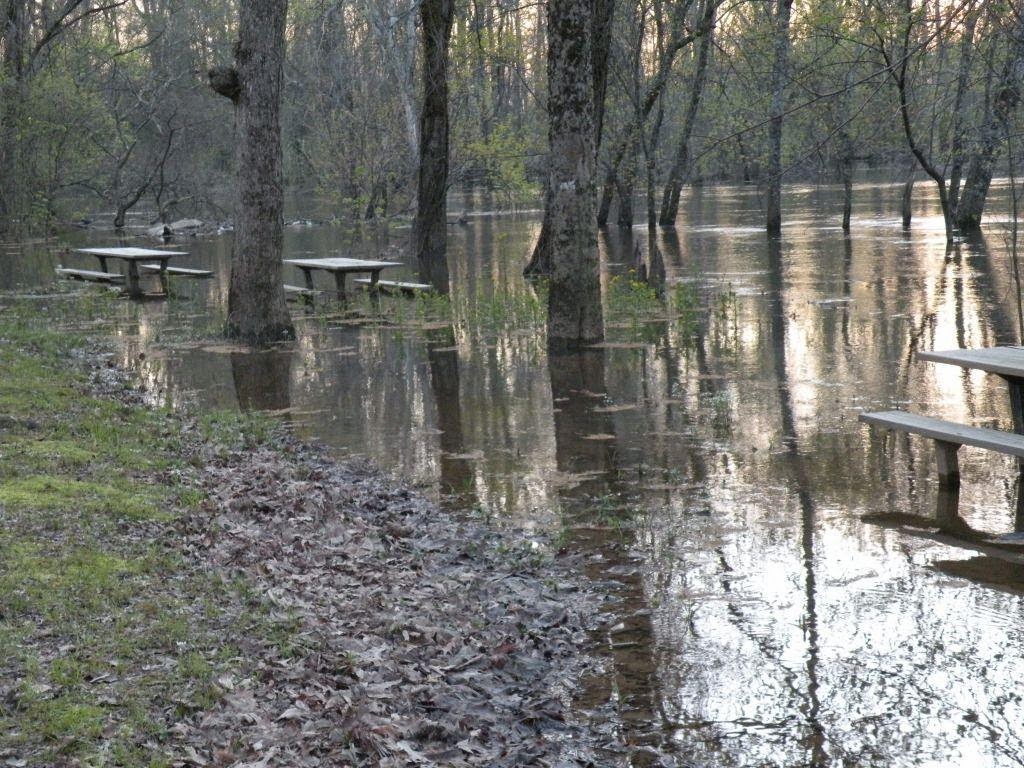April 30, 1864
---Battle of Jenkins Ferry, Arkansas: Gen. Steele, trying to cross the Saline River
in his retreat back to Little Rock, decides to turn and inflict some damage on
the pursuing Rebels led by Gen. Sterling Price of Missouri, since not all of
Steele’s men are able to cross the river on their pontoon bridge by the time
morning arrives. (Gen. Edmund Kirby
Smith, the Department commander, is close behind, with reinforcements for
Price.) Steele sets up his defensive
line only 400 yards wide, with earthworks and protected flanks, with the Saline
River at his back---forcing the Southerners to attack over open ground, much of
it muddy or even swampy. In direct
command is Brig. Gen. Samuel Rice with 4,000 Northern infantrymen and artillery. Price sends troops forward, and incurs severe
casualties, since the attacks are not coordinated. Battle smoke hangs heavy in the humid air,
obscuring visibility, and depriving Price of getting any good scouting
reports. Churchill is given conflicting
orders, and sends a regiment forward as skirmishers, and then orders Gen.
Tappan (the brigade commander) to go in with the rest of the brigade---but
Tappan soon discovers that the Federals facing him are much greater a force,
and he calls for reinforcements.
Churchill sends in Hawthorn’s brigade on Tappan’s flank, but Hawthorn
gets roughly handled, too. Gen. Price
sends in Gen. Mosby Parsons’ division to reinforce Churchill, but still were
unable to make headway. At one point,
the 2nd Kansas Colored Infantry and the 29th Iowa make a
counterattack and capture 3 Rebel cannon and somehow being them back through
the mire. When Kirby Smith arrives in
the afternoon, he has with him a division of Texas infantry under Gen. John
Walker, and sends them in---but only one brigade at a time, and they take heavy
losses, also. All three brigade
commanders under Walker are wounded---Gen. Scurry and Col. Randal are mortally
wounded. Waul’s brigade is sent in, but
several key officers are killed, leaving confusion in Waul’s command, and no
advance. As the Rebels withdraw, soldiers
of the 2nd Kansas Colored Infantry shoot as many Rebel wounded on
the field as possible, in retaliation for massacres of black wounded and
prisoners at Poison Springs and Mark’s Mill.
Soon after 3:00 PM, Steele sees his chance and pulls out of his lines,
crossed his pontoon bridge (and then burns it), and continues northward,
unmolested, to Little Rock. However, the
Federals lose many vehicles in the mud of the river bottoms. The Rebels are slow to pursue. And James Fagan’s 3,000 troopers do not
arrive until evening, and too late to take part in the battle. Losses are high on both sides, although this
is clearly a victory for the Federals, even if marginal. Union
Victory.
Losses: U.S., @700 C.S., @1,000
 |
| Jenkins Ferry battlefield today, flooded as it often is |
---On
this date, in a bid to allow the U.S. Navy gunboats at Alexandria to float over
the falls, volunteer engineers under Lt. Col. James Bailey, a former engineer,
begin constructing a coffer dam to raise the water level.
---John
Beauchamp Jones, of the Confederate War Department, writes in his journal about
preparations on both sides of the front lines, and the sense of expectation for
the new campaigning season:
APRIL 30TH.—Federal papers now admit that Gen. Banks
has been disastrously beaten in Louisiana. They also admit their calamity at
Plymouth, N. C. Thus in Louisiana, Florida, West Tennessee, and North Carolina
the enemy have sustained severe defeats: their losses amounting to some 20,000
men, 100 guns, half a dozen war steamers, etc. etc.
Gen. Burnside has left Annapolis and gone to Grant—whatever the plan was
originally; and the work of concentration goes on for a decisive clash of arms
in Virginia.
And troops are coming hither from all quarters, like streamlets flowing
into the ocean. Our men are confident, and eager for the fray.
The
railroad companies say they can transport 10,000 bushels corn, daily, into
Virginia. That will subsist 200,000 men and 25,000 horses. And in June the
Piedmont connection will be completed.
The great battle may not occur for weeks yet. It will probably end the
war.
---President
Abraham Lincoln, on this date, pens a letter to General Grant which has since
become famous in its clear reflection of Lincoln’s relationship with this
general, and the President’s trust in him:
EXECUTIVE MANSION, WASHINGTON, April 30, 1864.
LIEUTENANT-GENERAL GRANT:
Not expecting
to see you before the spring campaign opens, I wish to express in this way my
entire satisfaction with what you have done up to this time, so far as I
understand it.
The
particulars of your plans I neither know nor seek to know. You are vigilant and
self-reliant; and, pleased with this, I wish not to obtrude any restraints or
constraints upon you. While I am very anxious that any great disaster or
capture of our men in great number shall be avoided, I know that these points
are less likely to escape your attention than they would be mine. If there be
anything wanting which is within my power to give, do not fail to let me know
it.
And now, with
a brave army and a just cause, may God sustain you.
Yours very
truly,
A. LINCOLN.

No comments:
Post a Comment